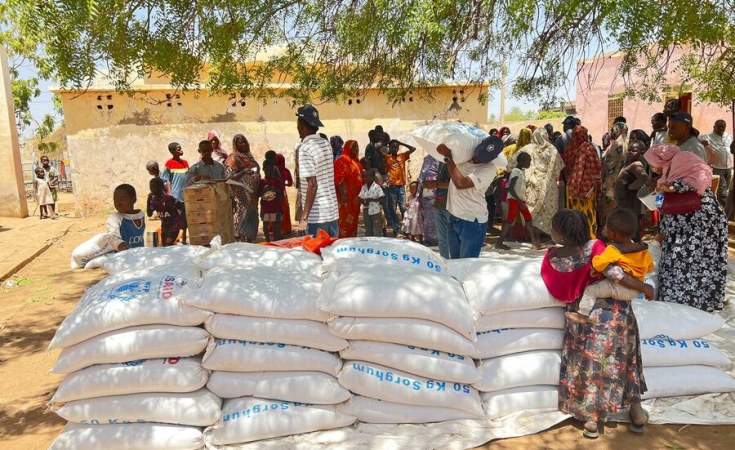The World Health Organisation (WHO) has warned that the crisis in Sudan has become one of the most severe and largest crises in the world, at a huge human cost, after a year of violent conflict. The UN organisation reported the death of more than 15,000 people since the start of the armed conflict in Sudan a year ago, according to statistics from the Sudanese Ministry of Health and the Armed Conflict Location & Event Data Project (ACLED).
Most civilian deaths were the result of the use of heavy weapons in densely populated areas, and women and children constitute a large percentage of reported victims, according to the WHO, which suggests that the number of reported victims is likely an underestimate.
The organisation also expects more deaths due to displacement, disease outbreaks, inability to access care for other health conditions, maternal and newborn health needs, and lack of access to food and water.
Speaking to reporters in Geneva, WHO spokesperson Christian Lindmeier said 15 million people needed urgent health assistance. The majority of health facilities are not functioning. The WHO has verified 62 attacks on health facilities over the past year, resulting in 38 deaths and 45 injuries, which have caused more than 25 per cent of all hospitals to stop working.
He warned that the health system is collapsing, especially in hard-to-reach areas, where health facilities have been destroyed, looted, or suffer from severe shortages of staff, medicines, vaccines, equipment, and supplies.
The worst hunger crisis in the world
Sudan currently represents the world's largest displacement crisis and could soon become one of the world's worst hunger crises, with more than a third of the population, 18 million people, facing acute food insecurity. Five million people are already on the brink of famine in conflict-affected areas. More than 3.5 million children suffer from acute malnutrition.
The WHO warned that 230,000 children, pregnant women, and new mothers could die in the coming months due to hunger unless urgent life-saving funding and aid is obtained, according to Save the Children.
Paris Conference on Sudan
As the world deals with multiple catastrophic crises, Sudan is underfunded, with the humanitarian response plan dedicated to health having received only 17 per cent of the required funding, so far.
On the occasion of the International Humanitarian Conference on Sudan, organised by the French Ministry of Foreign Affairs in Paris, with the support of the European Union and Germany, on Monday, April 15, the WHO, along with other United Nations agencies, called on the international community to make concrete commitments and increase its contributions to support the aid process and end the crisis, and the suffering of the people of Sudan.
Ceasefire necessary to prevent imminent famine
A new international report issued on Friday confirmed that the widespread acute food insecurity in Sudan requires urgent and large-scale interventions to enhance food aid, revitalise agricultural systems, and restore supply chains, to mitigate the food crisis and prevent its aggravation.
The report stressed that preventing imminent famine requires an immediate ceasefire, unimpeded humanitarian access, and increased support for interventions in the areas of food, nutrition, health, water, and sanitation.
The report entitled Livelihoods in Sudan Amid Armed Conflict was issued jointly by the United Nations Development Programme (UNDP) and the International Food Policy Research Institute. The report assesses the social and economic impacts of the ongoing armed conflict on rural areas in Sudan.
The report is based on analyses of a comprehensive survey among 4,504 rural households conducted by the two organisations from November 2023 to January 2024.
The study indicates that conflict has severely disrupted rural households' income and exacerbated existing vulnerabilities related to their housing and access to infrastructure and services. Most families live in inadequate housing conditions, and uneven access to water, electricity and sanitation services pose additional challenges. Rural families have difficulty accessing assets, including agricultural land, further complicating their livelihoods.
Thair Shraideh, acting resident representative of UNDP Sudan, said that understanding how the armed conflict in Sudan has affected people's lives and livelihoods provides an important basis for targeted interventions and policy reforms to mitigate the negative impacts of the conflict and enhance resilience and long-term economic stability.
The UN refugee agency (UNHCR) published a map showing the humanitarian situation in Sudan, the extent of the humanitarian needs, the volume of assistance provided, and the movement of displacement and asylum in neighbouring countries. It stated that the number of registered deaths was 14,700, and the number of forcibly displaced persons is more than 8,600,000. While the number of refugees to neighbouring countries reached 1,800,000 people.
South Sudan received the highest refugee wave, estimated at 640,000 people, followed by Chad, which received 571,000 people, while the expected number of arrivals to Egypt is 500,000 people.
The number of arrivals to the Central African Republic reached 29,000 people, Ethiopia 52,000, and no statistics appeared showing the number of arrivals to Eritrea.
United Nations reports estimate the number of people in need of humanitarian aid at nearly 25 million people in Sudan (24,800,000), and the number of those targeted at 14,700,000, while the number of those facing acute hunger, the third stage of the food security classification, reached 18 million people.


